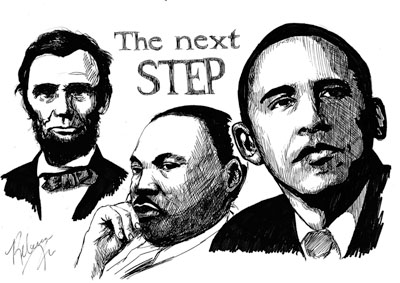
February is Black History Month, a month many Americans pass by as being just another reason for stores to have sales, people to hang posters in schools and TV stations to play specials. However, while the celebration has become more materialized than intended, President Barack Obama’s head-turning election should have Americans turning their heads yet again for the upcoming month now celebrated with more relevance than ever.
Since the early 20th century, Americans have recognized black history annually. Although it was first known as “Negro History Week” and now as “Black History Month,” the black population’s history was not officially documented until the existence of these recognitions. From the first African-American elected to a local office, town clerk John Mercer Langston of Ohio, to our new President of the United States, Barack Obama, not only the black population, but also all citizens of America have come a long way in embracing African-Americans as leaders of our society.
While most Americans realize the magnitude of how big of a step Obama’s election into office is for the black community, the majority are mostly likely unaware of the history behind African-Americans in the government.
While the first elected official was Langston in the 1800s, larger government roles such as U.S. representatives, senators and Secretary of State have been occupied by a total of only eight African-Americans in the past 139 years, one of those Senators being Obama. From Rep. Joseph Rainey’s election in 1870, to Secretary of State Colin Powell’s appointment in 2001, Barack Obama was not only the first black nominee for President but now the first black President as well.
As students at this school and citizens of the United States, we should take time to celebrate this special month. Learn about what makes this upcoming month so important and why its celebration is more relevant than ever. Get involved with Black History Month by participating in events honoring the African-American population.
In a time when America is experiencing change as the first ever black president takes office, take the initiative to not only learn about our new leader’s heritage, but the legacies of all black citizens that have made our country the great place we know it as today.




























![Keep the New Gloves: Fighter Safety Is Non-Negotiable [opinion]](https://hilite.org/wp-content/uploads/2024/12/ufcglovescolumncover-1200x471.png)
















































![Review: “We Live in Time” leaves you wanting more [MUSE]](https://hilite.org/wp-content/uploads/2024/12/IMG_6358.jpg)
![Review: The premise of "Culinary Class Wars" is refreshingly unique and deserving of more attention [MUSE]](https://hilite.org/wp-content/uploads/2024/12/MUSE-class-wars-cover-2.png)
![Introducing: "The Muses Who Stole Christmas," a collection of reviews for you to follow through winter [MUSE]](https://hilite.org/wp-content/uploads/2024/12/winter-muse-4.gif)
![Review: "Meet Me Next Christmas" is a cheesy and predictable watch, but it was worth every minute [MUSE]](https://hilite.org/wp-content/uploads/2024/11/AAAAQVfRG2gwEuLhXTGm3856HuX2MTNs31Ok7fGgIVCoZbyeugVs1F4DZs-DgP0XadTDrnXHlbQo4DerjRXand9H1JKPM06cENmLl2RsINud2DMqIHzpXFS2n4zOkL3dr5m5i0nIVb3Cu3ataT_W2zGeDAJNd_E-1200x884.jpg)
![Review: "Gilmore Girls", the perfect fall show [MUSE]](https://hilite.org/wp-content/uploads/2024/11/gilmore-girls.png)
![Review in Print: Maripaz Villar brings a delightfully unique style to the world of WEBTOON [MUSE]](https://hilite.org/wp-content/uploads/2023/12/maripazcover-1200x960.jpg)
![Review: “The Sword of Kaigen” is a masterpiece [MUSE]](https://hilite.org/wp-content/uploads/2023/11/Screenshot-2023-11-26-201051.png)
![Review: Gateron Oil Kings, great linear switches, okay price [MUSE]](https://hilite.org/wp-content/uploads/2023/11/Screenshot-2023-11-26-200553.png)
![Review: “A Haunting in Venice” is a significant improvement from other Agatha Christie adaptations [MUSE]](https://hilite.org/wp-content/uploads/2023/11/e7ee2938a6d422669771bce6d8088521.jpg)
![Review: A Thanksgiving story from elementary school, still just as interesting [MUSE]](https://hilite.org/wp-content/uploads/2023/11/Screenshot-2023-11-26-195514-987x1200.png)
![Review: "When I Fly Towards You", cute, uplifting youth drama [MUSE]](https://hilite.org/wp-content/uploads/2023/09/When-I-Fly-Towards-You-Chinese-drama.png)
![Postcards from Muse: Hawaii Travel Diary [MUSE]](https://hilite.org/wp-content/uploads/2023/09/My-project-1-1200x1200.jpg)
![Review: "Ladybug & Cat Noir: The Movie," departure from original show [MUSE]](https://hilite.org/wp-content/uploads/2023/09/Ladybug__Cat_Noir_-_The_Movie_poster.jpg)
![Review in Print: "Hidden Love" is the cute, uplifting drama everyone needs [MUSE]](https://hilite.org/wp-content/uploads/2023/09/hiddenlovecover-e1693597208225-1030x1200.png)
![Review in Print: "Heartstopper" is the heartwarming queer romance we all need [MUSE]](https://hilite.org/wp-content/uploads/2023/08/museheartstoppercover-1200x654.png)



